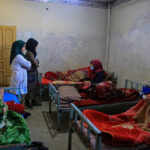
Since seizing power, the Taliban have aggressively reformed Afghanistan’s education system to enforce their strict Islamic ideology. A January 31, 2025, directive from the Ministry of Education mandates that all schools integrate religious curricula and appoint clerics to teach Islamic subjects, effectively sidelining secular learning.
Core subjects like life skills, civic education, arts, and culture have been slashed or replaced with Quranic studies. For younger students, essential lessons on social behaviors—such as road safety and respecting elders—are gone, while high schoolers lose access to patriotism and creative pursuits. Even school celebrations like Teacher’s Day and Mother’s Day are banned as “un-Islamic.”
Students feel the loss deeply. An 18-year-old in Kabul shared his shattered dreams of art and music, describing schools as “Taliban seminaries” that drain motivation. Younger children, like an eight-year-old girl, worry about where they’ll learn basic life lessons, amid constant Taliban inspections enforcing gender norms and religious obedience.

Teachers and activists decry the changes as catastrophic. A Kabul principal warned that removing these subjects leaves children unprepared for society, while an education advocate called the curriculum “destructive,” erasing cultural heritage and fostering indoctrination over critical thinking.
The Ministry has removed 51 lesson titles from textbooks, deeming them incompatible with Islamic teachings, and plans to review scientific subjects next. Critics label this a “black law” that not only rewrites books but also dooms Afghan children’s futures to rigid dogma.
This overhaul risks deepening Afghanistan’s isolation, turning a generation away from global knowledge toward ideological conformity. As one educator put it, the Taliban are not educating—they are reshaping minds to sustain their rule.



